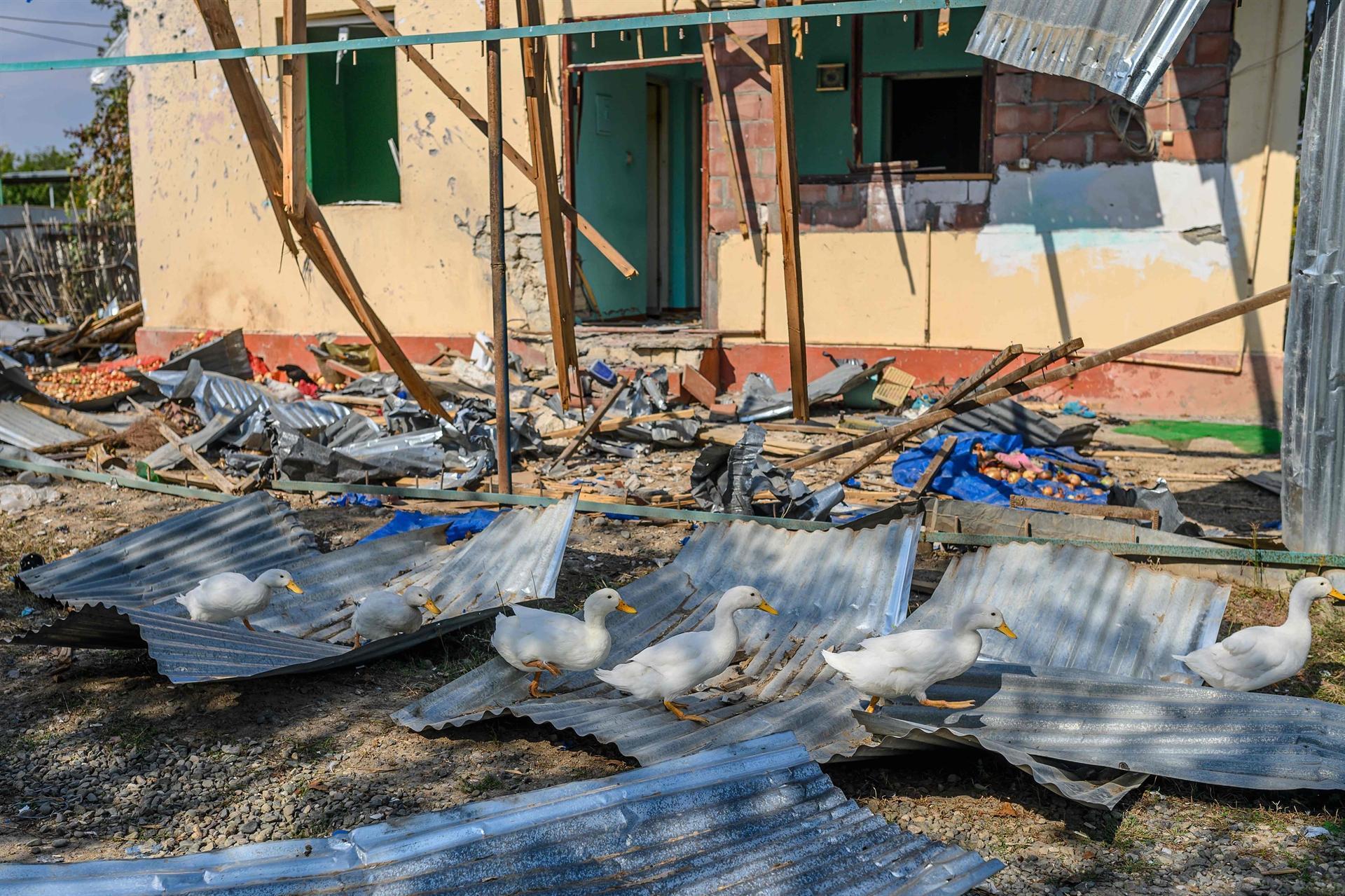
Armenian Prime Minister Nikol Pashinyan conceded on Oct. 14 that separatist fighters had been forced to withdraw from frontline positions in the north and south, describing the situation as "very serious".
"We must unite to stop the enemy, and achieve Karabakh's independence," he said in a televised address to the nation.
Hundreds have been killed in the fighting over the disputed region, and continued clashes have rendered almost meaningless a ceasefire agreed in Moscow last week.
Azerbaijan said on Oct. 14 it destroyed missile launchers inside Armenia that were targeting its cities.
Armenia confirmed that military positions inside the country were hit but denied its forces had been firing into Azerbaijan.
It warned that it too could start targeting military sites inside its adversary's territory.
Its foreign ministry later accused Azerbaijan of refusing to implement the ceasefire and of trying to "expand" the area of the conflict by attacking Armenia.
Meanwhile, on Oct. 15, Armenia once again hit civilians in western Azerbaijan causing fatalities and injuries.
The civilians had been visiting a cemetery in the western Terter city when the Armenian attack struck.
The Azerbaijani army has liberated eight more villages from Armenian occupation in Nagorno-Karabakh so far, Azerbaijan's President Ilham Aliyev announced on Oct. 14.
The regions of Jabrayil and Hadrut, as well as more than 30 villages, had previously been liberated in Azerbaijan's operations.
Azerbaijan's Prosecutor General's Office had earlier said on Thursday that at least 43 civilians had been killed and 218 injured due to the Armenian attacks that began in September.
Armenia's attacks have also rendered 1,592 houses, 79 apartments and 290 public buildings unusable.
Clashes over Nagorno-Karabakh have been largely confined to the region since a fresh outbreak of fighting started last month.
Moscow has so far refused to become drawn into the conflict - even though Armenia is part of a regional Russia-led security group - noting that the organization's treaty applies to Armenian territory, not Karabakh.
Overwhelmingly populated by ethnic Armenians, Nagorno-Karabakh has been controlled by Armenians since a 1990s war that erupted as the Soviet Union fell.
Azerbaijan has never hidden its desire to win back control and no state has recognized Nagorno-Karabakh's declaration of independence.
The latest fighting, which erupted on Sept. 27, has been the most intense since a 1994 ceasefire, claiming more than 600 lives, including more than 70 civilians, according to a tally based on partial tolls from both sides.
Each side has accused the other of targeting civilian areas with shelling, missile and rocket attacks, and on Oct. 14 Armenia said Azerbaijan had struck a hospital in Karabakh.
Azerbaijan's defense ministry said in statements on Oct. 14 that it had destroyed ballistic missile launchers deployed in Armenia in two attacks overnight.
The OTR-21 Tochka mobile systems were in areas of Armenia bordering the Kalbajar district of Azerbaijan that is under separatist control, it said.
Launchers at the first site were aiming at the Azerbaijani cities of Ganja, Mingachevir and other populated areas, it said.
Armenian defense ministry spokeswoman Shushan Stepanyan confirmed positions in the area were hit. But she denied that Armenian forces had ever fired "a single missile, shell or projectile" into Azerbaijan.
Armenia's military now "reserves the right to target any military installations and combat movements on the territory of Azerbaijan", she said.
Nagorno-Karabakh's regional capital Stepanakert was under heavy bombardment for days before the ceasefire, forcing thousands to flee or seek shelter in basements.
AFP journalists in the city said it was quiet on Oct. 14, after several days of relative calm since the ceasefire deal took effect midday on Oct. 10.
In the frontline settlement of Bakharly in Azerbaijan, the constant thuds of shelling could be heard as villagers said they were under regular fire.
Of the 800 families in the village, most of whom fled Karabakh in the 1990s, only about 100 men remained, hunkering down in shelter.
"By staying here, we feel that we are also fighting," 66-year-old Sakhib Adket said, standing next to a World War I-style trench in his garden.
Securing a lasting resolution to the conflict, one of the most enduring problems left after the fall of the USSR, is in the hands of the Minsk Group chaired by France, Russia and the United States.
The group has urged the two sides to fully implement the Moscow truce agreement, which also calls for a return to long-stalled negotiations over Karabakh.
Russian officials on Oct. 14 appealed again to both sides to halt fighting and said Moscow was ready to deploy "military observers" to the frontline to help secure the truce.
Azerbaijan's close ally Turkey is angling for a position at the negotiating table, and the country's President Ilham Aliyev on Oct. 14 said that "Turkey must be actively involved in the conflict settlement".